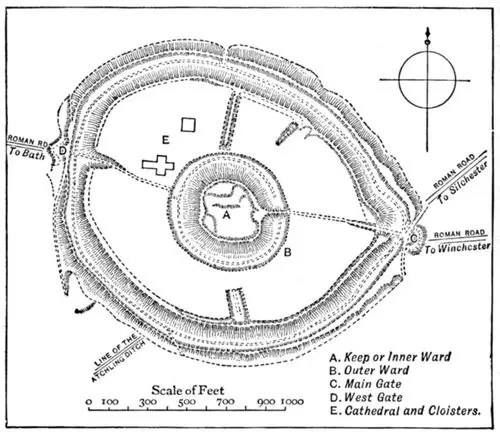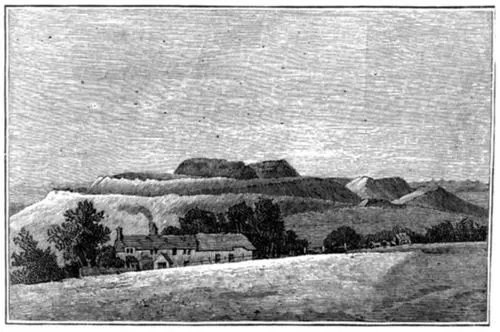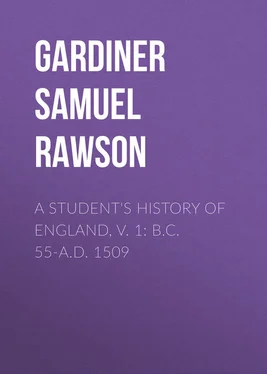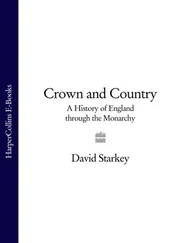Samuel Gardiner - A Student's History of England, v. 1 - B.C. 55-A.D. 1509
Здесь есть возможность читать онлайн «Samuel Gardiner - A Student's History of England, v. 1 - B.C. 55-A.D. 1509» — ознакомительный отрывок электронной книги совершенно бесплатно, а после прочтения отрывка купить полную версию. В некоторых случаях можно слушать аудио, скачать через торрент в формате fb2 и присутствует краткое содержание. Издательство: Иностранный паблик, Жанр: foreign_prose, История, foreign_antique, на английском языке. Описание произведения, (предисловие) а так же отзывы посетителей доступны на портале библиотеки ЛибКат.
- Название:A Student's History of England, v. 1: B.C. 55-A.D. 1509
- Автор:
- Издательство:Иностранный паблик
- Жанр:
- Год:неизвестен
- ISBN:нет данных
- Рейтинг книги:5 / 5. Голосов: 1
-
Избранное:Добавить в избранное
- Отзывы:
-
Ваша оценка:
- 100
- 1
- 2
- 3
- 4
- 5
A Student's History of England, v. 1: B.C. 55-A.D. 1509: краткое содержание, описание и аннотация
Предлагаем к чтению аннотацию, описание, краткое содержание или предисловие (зависит от того, что написал сам автор книги «A Student's History of England, v. 1: B.C. 55-A.D. 1509»). Если вы не нашли необходимую информацию о книге — напишите в комментариях, мы постараемся отыскать её.
A Student's History of England, v. 1: B.C. 55-A.D. 1509 — читать онлайн ознакомительный отрывок
Ниже представлен текст книги, разбитый по страницам. Система сохранения места последней прочитанной страницы, позволяет с удобством читать онлайн бесплатно книгу «A Student's History of England, v. 1: B.C. 55-A.D. 1509», без необходимости каждый раз заново искать на чём Вы остановились. Поставьте закладку, и сможете в любой момент перейти на страницу, на которой закончили чтение.
Интервал:
Закладка:
15. Punishments.—When a man had failed in the ordeal there was a choice of punishments. If his offence was a slight one, a fine was deemed sufficient. If it was a very disgraceful one, such as secret murder, he was put to death or was degraded to slavery, in most cases he was declared to be a 'wolf's-head'—that is to say, he was outlawed and driven into the woods, where, as the protection of the community was withdrawn from him, anyone might kill him without fear of punishment.
16. The Folk-moot.—As the hundred-moot did justice between those who lived in the hundred, so the folk-moot did justice between those who lived in different hundreds, or were too important to be judged in the hundred-moot. The folk-moot was the meeting of the whole folk or tribe, which consisted of several hundreds. It was attended, like the hundred-moot, by four men and the reeve from each township, and it met twice a year, and was presided over by the chief or Ealdorman. The folk-moot met in arms, because it was a muster as well as a council and a court. The vote as to war and peace was taken in it, and while the chief alone spoke, the warriors signified their assent by clashing their swords against their shields.
17. The Kingship.—How many folks or tribes settled in the island it is impossible to say, but there is little doubt that many of them soon combined. The resistance of the Britons was desperate, and it was only by joining together that the settlers could hope to overcome it. The causes which produced this amalgamation of the folks produced the king. It was necessary to find a man always ready to take the command of the united folks, and this man was called King, a name which signifies the man of the kinship or race at the head of which he stood. His authority was greater than the Ealdorman's, and his warriors were more numerous than those which the Ealdorman had led. He must come of a royal family—that is, of one supposed to be descended from the god Woden. As it was necessary that he should be capable of leading an army, it was impossible that a child could be king, and therefore no law of hereditary succession prevailed. On the death of a king the folk-moot chose his successor out of the kingly family. If his eldest son was a grown man of repute, the choice would almost certainly fall upon him. If he was a child or an invalid, some other kinsman of the late king would be selected.
18. The Legend of Arthur.—Thirty-two years passed away after the defeat of the West Saxons at Mount Badon in 520(see p. 28) before they made any further conquests. Welsh legends represent this period as that of the reign of Arthur. Some modern inquirers have argued that Arthur's kingdom was in the north, whilst others have argued that it was in the south. It is quite possible that the name was given by legend to more than one champion; at all events, there was a time when an Ambrosius, probably a descendant of Ambrosius Aurelianus (see p. 27), protected the southern Britons. This stronghold was at Sorbiodunum, the hill fort now a grassy space known as Old Sarum, and his great church and monastery, where Christian priests encouraged the Christian Britons in their struggle against the heathen Saxons, was at the neighbouring Ambresbyrig ( the fortress of Ambrosius ), now modernised into Amesbury. Thirty-two years after the battle of Mount Badon the kingdom of Ambrosius had been divided amongst his successors, who were plunged in vice and were quarrelling with one another.

Plan of the city of Old Sarum, the ancient Sorbiodunum . The Cathedral is of later date.
19. The West Saxon Advance.—In 552Cynric, the West Saxon king, attacked the divided Britons, captured Sorbiodunum, and made himself master of Salisbury Plain. Step by step he fought his way to the valley of the Thames, and when he had reached it, he turned eastwards to descend the river to its mouth. Here, however, he found himself anticipated by the East Saxons, who had captured London, and had settled a branch of their people under the name of the Middle Saxons in Middlesex. The Jutes of Kent had pushed westwards through the Surrey hills, but in 568the West Saxons defeated them and drove them back. After this battle, the first in which the conquerors strove with one another, the West Saxons turned northwards, defeated the Britons in 571at Bedford, and occupied the valleys of the Thame and Cherwell and the upper valley of the Ouse. They are next heard of much further west, and it has been supposed that they turned in that direction because they found the lower Ouse already held by Angle tribes. However this may have been, they crossed the Cotswolds in 577under two brothers, Ceawlin and Cutha, and at Deorham defeated and slew three kings who ruled over the cities of Glevum ( Gloucester ), Corinium ( Cirencester ), and Aquæ Sulis ( Bath ). They seized on the fertile valley of the Severn, and during the next few years they pressed gradually northwards. In 584they destroyed and sacked the old Roman station of Viriconium. This was their last victory for many a year. They attempted to reach Chester, but were defeated at Faddiley by the Britons, who slew Cutha in the battle.

Old Sarum from an engraving published in 1843, showing mound. (It is now obscured by trees from this point of view.)
20. Repulse of the West Saxons.—After the defeat at Faddiley the West Saxons split up into two peoples. Those of them who settled in the lower Severn valley took the name of Hwiccan, and joined the Britons against their own kindred. This alliance could hardly have taken place if the Hwiccan, in settling in the Severn valley, had destroyed the whole, or even a considerable part, of the Celtic population, though there can be little doubt that there was still slaughter when a battle was fought or a town taken by storm; as it is known that the magnificent Roman buildings at Bath were standing in ruins and the city untenanted many years after the capture of the city. At all events, the Britons, now allied with the Hwiccan, defeated Ceawlin at Wanborough. After this disaster, though the West Saxon kingdom retained its independence, it was independent within smaller limits than those which Ceawlin had wished to give to it. If he had seized Chester he would have been on the way to gain the mastery over all England, but he had tried to do too much in a short time. His people can hardly have been numerous enough to occupy in force a territory reaching from Southampton Water to Bedford on one side and to Chester on another.
21. The Advance of the Angles.—Whilst the West Saxons were enlarging their boundaries in the south, the Angles were gradually spreading in the centre and the north. The East Anglians were stopped on their way to the west by the great fen, but either a branch of the Lindiswara or some new-comers made their way up the Trent, and established themselves first at Nottingham and then at Leicester, and called themselves the Middle English. Another body, known as the Mercians, or men of the mark or border-land, seized on the upper valley of the Trent. North of the Humber the advance was still slower. In 547, five years before the West Saxons attacked Sorbiodunum, Ida, a chieftain of one of the scattered settlements on the coast, was accepted as king by all those which lay between the Tees and the Forth. His new kingdom was called Bernicia, and his principal fortress was on a rock by the sea at Bamborough. During the next fifty years he and his successors enlarged their borders till they reached that central ridge of moorland hill which is sometimes known as the Pennine range. The Angles between the Tees and the Humber called their country Deira, but though they also united under a king, their progress was as slow as that of the Bernicians. Bernicia and Deira together were known as North-humberland, the land north of the Humber, a much larger territory than that of the modern county of Northumberland.
Читать дальшеИнтервал:
Закладка:
Похожие книги на «A Student's History of England, v. 1: B.C. 55-A.D. 1509»
Представляем Вашему вниманию похожие книги на «A Student's History of England, v. 1: B.C. 55-A.D. 1509» списком для выбора. Мы отобрали схожую по названию и смыслу литературу в надежде предоставить читателям больше вариантов отыскать новые, интересные, ещё непрочитанные произведения.
Обсуждение, отзывы о книге «A Student's History of England, v. 1: B.C. 55-A.D. 1509» и просто собственные мнения читателей. Оставьте ваши комментарии, напишите, что Вы думаете о произведении, его смысле или главных героях. Укажите что конкретно понравилось, а что нет, и почему Вы так считаете.












